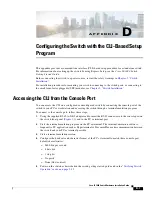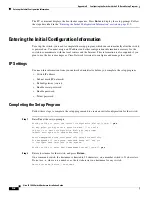
C-1
Cisco IE 3000 Switch Hardware Installation Guide
A P P E N D I X
C
Cable and Connectors
This appendix describes the switch ports and the cables and adapters that you use to connect the switch
to other devices.
Connector Specifications
These sections describe the connectors used with the Cisco IE 3000 switch.
10/100 Ports
The 10/100 and 10/100/1000 Ethernet ports on switches use standard RJ-45 connectors and Ethernet
pinouts with internal crossovers.
show the pinouts.
The auto-MDIX feature described briefly in this guide is enabled by default. For configuration
information for this feature, see the switch software configuration guide or the switch command
reference.
The PoE ports on the PoE expansion modules integrate power and data signals on the same wires. The
ports use standard RJ-45 connectors and Ethernet pinouts with internal crossovers.
shows the
pinouts.
Connecting to 10BASE-T- and 100BASE-TX-Compatible Devices
When connecting the ports to 10BASE-T- and 100BASE-TX-compatible devices, such as servers,
workstations, and routers, you can use a two or four twisted-pair, straight-through cable wired for
10BASE-T and 100BASE-TX.
shows the two twisted-pair, straight-through cable
schematics.
shows the four twisted-pair, straight-through cable schematics.
When connecting the ports to 10BASE-T- and 100BASE-TX-compatible devices, such as switches or
repeaters, you can use a two or four twisted-pair, crossover cable.
shows the two twisted-pair,
crossover cable schematics.
shows the four twisted-pair, crossover cable schematics.
You can use Category 3, 4, or 5 cabling when connecting to 10BASE-T-compatible devices. You must
use Category 5 cabling when connecting to 100BASE-TX-compatible devices.






























